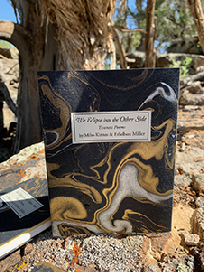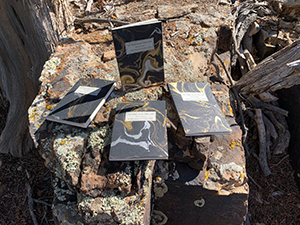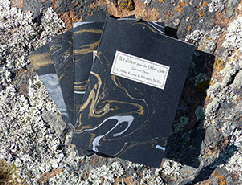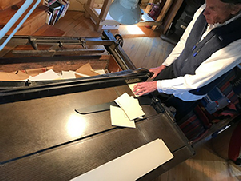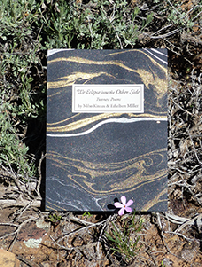Page last updated: May 16, 2023
All pages copyright © 2023 by Pinyon Publishing

WE ECLIPSE INTO THE OTHER SIDE
Twoness Poems by Miho Kinnas and E. Ethelbert Miller
Handmade Limited Edition, 100 numbered copies
4.625”x6.25”, 60 pages, 80-lb Text Paper
Indian Marble and Bugra Decorative Papers
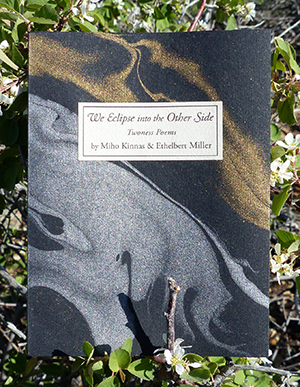
“Poets Miho Kinnas and E. Ethelbert Miller write poetry that whispers with sensual lines, allusions, and imaginative metaphors in twoness without duality. Through ‘tender darkness’ and ‘the last bright light of day,’ these poets achieve creative balance. They connect the past with trinkets and show us how these ‘fragments are the most beautiful things in the world.’ These poems smell the ocean waves, play piano chords, and translate touch. With lyricism and declarative power, two poetic forces momentarily conjoin during an eclipse of passing souls.
—TIM CONROY, writer and poet
“So, why do I like Miho Kinnas and E. Ethelbert Miller's work?
“First, because it is good jamming, or collaborative improvisation if you prefer a formal word. Freer than the formal collective serial-poems called rengu or renga and more like Seishonagon’s looser lists that seeded the art of yose-awase developed over the past millennium of Japanese literature. Literally sidling-beside one-another, this means to pair things in creative ways rather than conventional matches.
“Second, my middling taste finds much of the content interesting. There are fine details, but no trivia for the sake of trivia, and while ideas abound, they are not cheapened by academic labels but contextually spiced to make tasty food for the mind. I love Mary Cavendish channeling Watts the hunted hare, Rilke telling us gold wishes to be buried again and John Clare speaking up for Swords Well a pillaged commons. Some more extended advocacy might have delighted me, but I love the treatment of objects recalling Ponge’s door knob or courtesan horse, more personal (time, place, family and race/culture-based) memories than common in old poems excepting some by Clare from the Asylum in England or Issa in Japan and unlike most contemporary, so-called modern, poems in Japan or the US, none of this seems narcissist, but something worth sharing with others, as expected from two playful mature poets.
“Third, style. No literary critic, I have stronger opinions about the plastic arts. To my mind, realism is worthless now we have photos and purely abstract art is sterile so I am drawn to cubism, impressionism, surreal art in the broadest sense of the genres. I feel these poems, while including precise pictures and puzzling abstraction, have play enough on the whole to hold my interest as they morph like cumulous clouds as they drift along though I feel this differently than watching the drama in the sky—as I sense the poets groping and enjoy the jamming trip right up to the ends which, like good music, are well done.
“Truly unique poems are rare.”
—ROBIN D GILL, the prolific author of A Dolphin in the Woods, In the Floods A Wild Boar: Composite Translation, Kyōka, Japan's Comic Verse, Cherry Blossom Epiphany: The poetry and philosophy of a flowering tree, Orientalism & Occidentalism, Topsy-Turvy 1585: a translation and explication of of Luis Frois among others.

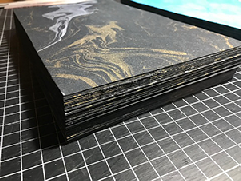
“An extraordinarily moving collection by two accomplished poets, We Eclipse to the Other Side invests in the power of the word both to forge connection and to imagine otherwise. Miller and Kinnas mingle their voices, placing them in dialogue, counterpoint, and unison. Transgressing the singularity of the lyric ‘I,’ Miller and Kinnas offer portals to other ways of knowing rooted in the promise of beloved community and the potential of language to realize it.
—EMILY RUTH RUTTER, Ball State University
“A mixture of marvel, surprise, and joy accompanied most of my reading of the sensitive, conversational & philosophical poems that Miho and Ethelbert created in tandem. It was uncanny the way they mirrored my own world—whether it was about an octopus or a broken heart, a melting blizzard, or the human need for the vastness of the sea, whether it was a daily reminder not to be terrified of the sound of our own breathing, or how the universe embraces our willful desire to write & speak, or simply the heat of everyday sunshine sparking desire.
“Nestled in many small details, the flow of linguistic & loving energy between the two poets was often in tune with my own transformational year. It has been a pleasure to look with delight at the offerings that Ethelbert shared, and to find my own heartbeat among the lines that ricocheted between the minds & wrists of these wise writers. Very grateful to see this book born into the world.”
—HIND SHOUFANI, filmmaker and writer

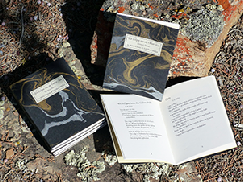
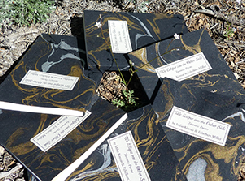

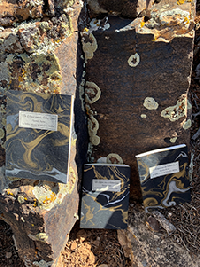
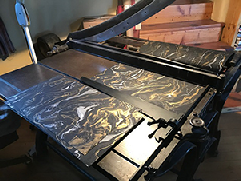
 MIHO KINNAS is a Japanese poet and translator. Her two collections of poetry are Today, Fish Only and Move Over, Bird (Math Paper Press). Twice nominated for the Pushcart Prize, her most recent poems, book reviews, and translations are found in Tokyo Poetry Journal, The Best American Poetry 2023, Soul Spaces: Poems on Cities, Towns and Villages, The Petigru Review, and Alluvium: Literary Shanghai. She operates a pop-up community bookshop, An Island Bookshelf, on Hilton Head Island, SC where she lives and swims.
MIHO KINNAS is a Japanese poet and translator. Her two collections of poetry are Today, Fish Only and Move Over, Bird (Math Paper Press). Twice nominated for the Pushcart Prize, her most recent poems, book reviews, and translations are found in Tokyo Poetry Journal, The Best American Poetry 2023, Soul Spaces: Poems on Cities, Towns and Villages, The Petigru Review, and Alluvium: Literary Shanghai. She operates a pop-up community bookshop, An Island Bookshelf, on Hilton Head Island, SC where she lives and swims. E. ETHELBERT MILLER is a literary activist and author of two memoirs and several poetry collections. He hosts the WPFW morning radio show On the Margin with E. Ethelbert Miller and hosts and produces The Scholars on UDC-TV which received a 2020 Telly Award. Miller is Associate Editor and a columnist for The American Book Review. He was given a 2020 congressional award from Congressman Jamie Raskin in recognition of his literary activism, awarded the 2022 Howard Zinn Lifetime Achievement Award by the Peace and Justice Studies Association, and named a 2023 Grammy Nominee Finalist for Best Spoken Word Poetry Album. Miller’s latest book is How I Found Love Behind the Catcher’s Mask, published by City Point Press.
“To experience Twoness Poems by Miho Kinnas and E. Ethelbert Miller is to accept an invitation into a world of friendship, beauty, and surprise. These two gifted poets write together though apart—not in the same geographical space, yet they find a common language to explore and improvise whether writing a sonnet about having breakfast with Shakespeare, an ‘Ode to a Basement,’ ‘Whales and Wailers,’ or a simple ‘Bowl of Rice.’ One writes a line, a sentence, maybe a stanza or an image, the other responds, the process repeats until a poem emerges—an email call and response. Allusions abound, images entice, music and play weave throughout these sumptuous poems that collectively suggest a way toward healing during our divisive and discordant times. As Miho and Ethelbert brew what they call ‘a complex broth,’ they remind us that there might be a better way of living—deeply, madly, even dangerously—together.”
—RENEE SHEA, freelance writer, educational consultant, and former professor of English at Bowie State University

